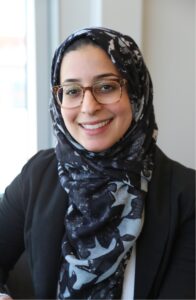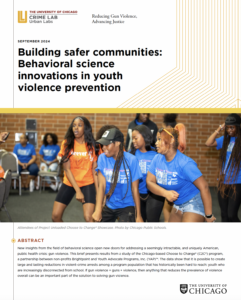Youth Advocate Programs

The Crime Lab and Education Lab, in partnership with Youth Advocate Programs, Inc. (YAP), conducted a randomized controlled trial of YAP’s wraparound advocacy services to evaluate the program’s impact on youth academic outcomes and violence engagement outcomes.
Challenge
Youth violence in Chicago, like in most large cities in the United States, has been a persistent challenge for decades. Chicago has tested many programs and strategies over the years, all with the hope of identifying effective and lasting approaches to reduce the number of young people involved with violence as either victims or offenders.
Opportunity
Reaching disengaged youth at higher risk of violence engagement requires an intensive model to reach and actively engage such youth. One potential promising approach is Youth Advocate Programs, inc. (YAP). YAP’s wraparound services are rooted in building trusting relationships between youth and trained mentors. These mentors work intensively and holistically with youth and their families for an extended period of time, providing individualized, immediate support and connecting families to resources within their communities. In 2018, YAP, Chicago Beyond, and the Crime Lab and Education Lab partnered to implement a randomized controlled trial to measure the causal effects of YAP’s wraparound services on key academic and violence engagement outcomes for high-need youth in Chicago.
Project overview
The randomized controlled trial (RCT) studies the YAP model in its “purest” form by imposing minimal restrictions on who YAP serves, overall program length, and the types of service referrals that are provided. YAP directors and advocates have emphasized that the key feature of the YAP model is the ability of YAP staff to continually modify program delivery for each participant based on their assessed needs and goals. Our impact evaluation seeks to assess the impact of YAP on participants’ school engagement and violence involvement.
To complement the RCT, we use program engagement and qualitative data to develop a comprehensive understanding of the components of YAP’s services and how outcomes may be achieved through an in-depth implementation evaluation. Our qualitative study involved interviews with YAP service providers, YAP clients, and individuals in the client’s personal network; and extended observations of YAP service providers in the field.
Analysis for both the RCT and the implementation evaluation is ongoing.
Years Active
2018 – present
Topics
Project Leads
Heather Bland
Research Manager

Monica Bhatt
Senior Research Director

Nour Abdul-Razzak
Research Director, Inclusive Economy Lab


Longer-Term Impacts of a Youth Behavioral Science Intervention: Experimental Evidence from Chicago
This paper details updated results from a study of Choose to Change® (C2C®), a trauma-informed cognitive behavioral therapy and intensive mentoring program developed by nonprofits Brightpoint and Youth Advocate Programs, Inc. (YAP).

Choose to Change® (C2C®) Program Guide
This program guide is intended for community-based organizations working to fill gaps in services and reach an underserved population of youth impacted by violence and trauma.

Building safer communities: Behavioral science innovations in youth violence prevention
This policy brief highlights results from a large-scale randomized controlled trial that evaluated the impact of Choose to Change® (C2C®) on participants’ criminal justice involvement.

Unpacking the Impacts of a Youth Behavioral Health Intervention: Experimental Evidence from Chicago
This working paper details results from a study of Choose to Change® (C2C®), a trauma-informed cognitive behavioral therapy and intensive mentoring program developed by nonprofits Brightpoint and Youth Advocate Programs, Inc. (YAP).
